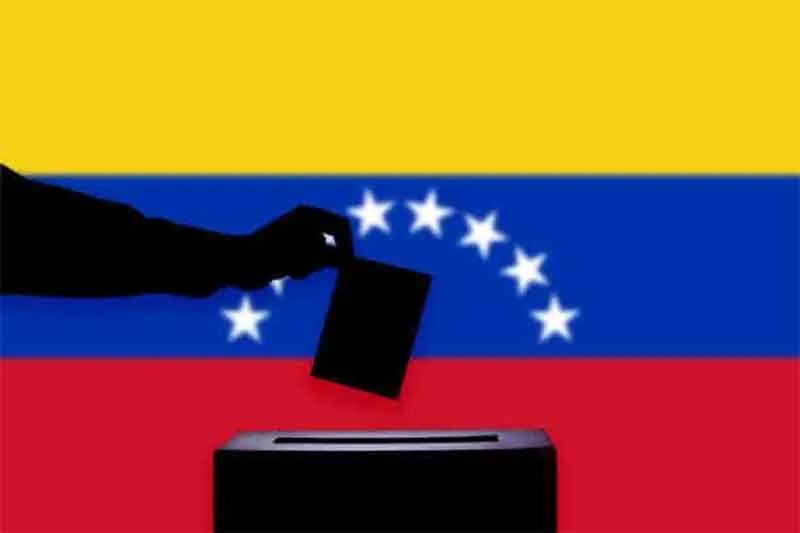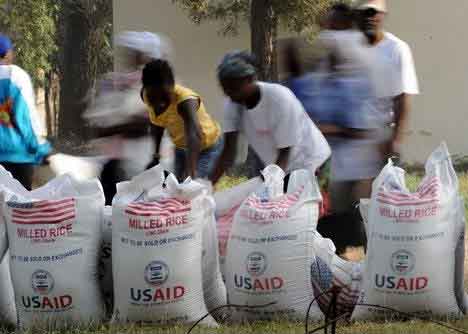
The Non-Aligned Movement (NAM) has condemned hostile U.S. policies against Venezuela.
The non-aligned countries demanded on Sunday that the U.S. immediately lift economic and financial sanctions against Venezuela.
The NAM members, in a statement, indicated that only Venezuela can decide its fate, no other state can intervene in Venezuela.
The two-day ministerial meeting of the Coordinating Bureau of the NAM (Co-BNAM) began on July 20 in Caracas. Delegations of 120 NAM countries joined the meeting.
The NAM countries reiterated their commitment to redouble efforts aimed at channeling the government and the Venezuelan opposition to find a peaceful solution to the problems of the country.
The NAM supports the Montevideo mechanism, the mediation of Norway and other mechanisms that seek stability in Venezuela.
Russian Deputy Minister Sergei Riabkov said that US measures are suffocating Venezuela.
Cuba, Venezuela, Iran and Bolivia said the U.S. foreign policy of unilateralism is destabilizing world peace. The countries called for dialogue among nations.
The NAM called for stronger multilateralism against the hegemony of powerful states that undermine the world order and international law.
Jorge Arreaza, the Bolivarian Foreign Minister, said at the opening of the meeting: “We are experiencing a historic moment in which multilateralism is being attacked, a systemic phenomenon that affects many countries in the world (with) coups d’états, political and economic destabilization, geopolitical interests.”
Arreaza insisted on the right to peace, and for the people of countries, to decide their future without external pressures.
Venezuela, Cuba, Iran, Syria, Nicaragua, North Korea are victims of interventionism. Foreigners insist on a change of government in these countries. The foreigners bet on servile regimes that will bend to their interests, said Arreaza.
Greeting the delegates, Cuban Foreign Minister Bruno Rodriguez said his country “urges all states to refrain from exerting pressure on other countries in flagrant violation of the human rights of the peoples of the world.”
Rodriguez expressed Cuba’s support for Venezuelan President Nicolas Maduro, the Bolivarian Revolution and its people while rejecting Washington’s interference in both countries.
The diplomat expressed that the actions of the U.S. – recognizing Jerusalem the capital of Israel, and declaring Syria’s Golan Heights a part of Israel; withdrawing from Iran nuclear deal, increasing sanctions and military measures on Iran – are intensifying long-held Middle East conflict.
Diego Pary Rodriguez, Bolivian Foreign Minister, said multilateralism is the only space in which peoples and states can debate on equal terms in the search and formation of peace for the countries of the world.
“The defense of multilateralism is not an option but a vital necessity to defend our interests, with respect to our diversity, our differences, our sovereignty and on the basis of the principles and norms of international law,” said the Bolivian minister.
The president of the UN General Assembly Maria Fernanda Espinosa said in her speech transmitted via video that the NAM must continue to fiercely defend the respect for sovereignty, the right to self-determination, international solidarity and peace and development for all people.
Espinosa said that NAM is essential to the response to the great challenges facing society: poverty eradication, inequality reduction, the protection of the environment and ensuring that all people have healthcare, education and decent work.
The UN diplomat said that both organizations agree on maintaining peace and preventing conflicts, promoting dialogue, cooperation and fair solutions for all.
UN Human Rights Council rejects U.S. sanctions
The UN Human Rights Council adopted a resolution condemning the imposition of sanctions by the U.S. and its allies against Venezuela and other member states on Saturday.
The draft resolution was approved with 28 votes in favor, 14 against, and 5 abstentions. The resolution was presented by Venezuela and Palestine on behalf of the NAM during the 41st session of the Council.
“A victory that expands international cooperation and rejects imperial sanctions,” Venezuelan President Nicolas Maduro tweeted Sunday.
The document reaffirmed the “inalienable right” of every country “to choose freely and develop, in accordance with the sovereign will of its people, its own political, social, economic and cultural systems, without interference from any other state or non-state actor.”
In May, Idriss Jazairy, the UN’s special rapporteur on the negative impact of sanctions, expressed that the use of economic sanctions against Cuba, Venezuela, and Iran for political purposes violates human rights and international law.
Yet, this latest resolution comes at a key moment for Venezuela as its government has systematically rejected the report presented by the UN High Commissioner for Human Rights Michelle Bachelet. In it, Bachelet omits major social policies of Maduro’s administration and fails to mention the simultaneous economic attacks against the country by the U.S. government.
Since 2017, the White House has imposed 150 sanctions on individuals and organizations of Venezuela.
The sanctions have resulted in the direct deaths of over 40,000 citizens of Venezuela due to lack of food and medicine, as well as a loss of around US$116 billion for Venezuela, according to the country’s Vice President of Planning Ricardo Menendez and a recent independent report from the Center for Economic and Policy Research.
OPEC against embargo on Venezuelan oil
Mohammed Barkindo, the secretary general of the Organisation of Petroleum Exporting Countries (OPEC), blasted US-led sanctions against Venezuela’s oil industry.
Speaking days before the 176th meeting of the OPEC Conference, Barkindo explained that “For us in OPEC, the sanctions imposed on two of our founders and big oil producers for the international market [Venezuela and Iran], are sanctions for all of us, because if you take these two countries out of the equation that will affect the entire OPEC.”
Barkindo endorsed a diplomatic solution towards ending the sanctions, which have caused uncertainty in the oil market, stating, “dialogue will help resolve issues and differences.”
OPEC and oil producing non-OPEC members, grouped into the OPEC+, also agreed to extend production caps at their meeting in Vienna. These caps have seen some oil prices rise by 25 percent this year, and will be extended until March 2020. Venezuela, Libya and Iran are, however, exempt from these restrictions.
Venezuela’s oil sector, responsible for 95 percent of foreign currency income, has been particularly affected with the U.S. imposed financial sanctions against state oil company PDVSA in August 2017 and an oil embargo imposed in January.
Following Washington’s recognition of self-declared “Interim President” Juan Guaido on January 23, a freeze was also imposed on Venezuela’s US-based oil assets, chief among them PDVSA’s US subsidiary, CITGO, which supplied large amounts of diluents needed for crude processing to Venezuela. US authorities have since looked to transfer control of Venezuelan state assets to Guaido’s team.
Guaido named a parallel board of directors for CITGO in February, a move which PDVSA is currently disputing by asking that the Delaware Chancery Court confirm that the Venezuelan state controls CITGO and two related companies. Guaido’s representative in Washington, Carlos Vecchio, is reportedly being investigated over accusations of embezzlement of CITGO funds.
While a number of US authorities have already ruled in favor of recognizing Guaido and his team as Venezuela’s political and diplomatic representatives in the country, including in the battle over the Venezuelan embassy in Washington, the legal status of Venezuelan assets in US territory has yet to be settled.
Venezuela looks to Asian markets for oil sales
Speaking at the OPEC meeting, Venezuela’s Oil Minister Manuel Quevedo reaffirmed his country’s priority in recovering oil production and avoiding U.S. sanctions.
According to Quevedo, “Our plan is to recover. We have internal strategies. One of those is to continue blending the product we export the most, Merey crude. We will continue blending our own crudes and will also import crude.”
Merey heavy crude is the preferred product of the Asian markets, to which Venezuela has increasingly looked following the oil embargo.
China has now become the main destination for Venezuelan oil, with Beijing receiving 656,000 barrels per day (bpd) in June, around 59 percent of the Latin American country’s total output. This figure marks a pronounced increase from the 233,000 bpd shipped to the Asian giant in February, but still below the one million bpd target set by both governments last year. Venezuelan crude exports to China form part of oil-for-loan agreements in the context of credit and investment projects established in the Caribbean country.
However, the documents suggest that oil sales to India have dropped to 200,000 bpd, or 18 percent of Venezuela’s output, while those to Singapore sit at 10 percent.
While the Venezuelan government looked at significantly increase sales to India following January’s embargo, U.S. pressure on New Delhi has seen the commercial ties cool down.
No Venezuelan crude was refined in US-based refineries, following the end of a three-month winding down period for the embargo. Shipments to Europe are reported as remaining stable at 85,000 bpd.
Venezuelan oil production also seems to be offering positive signs, reportedly rebounding in June, increasing 26 percent to 1.1 million bpd, up from 874,000 in May.
Venezuela’s oil production decline has been significantly exacerbated by the impact of U.S. economic sanctions, with crude output dropping by 30 percent, from an average of 1.911 million bpd in 2017 to 1.354 million in 2018, following the August 2017 financial sanctions imposed by the Trump administration.
Output fell further in 2019 following the January oil embargo as well as nationwide electricity blackouts in March, falling to just 740,000 bpd in March.
According to Reuters, imports of fuel and diluents to Venezuela also continued to diminish for the third consecutive month to 117,100 bpd, down 20,000 bpd from May and nearly half the 200,000 bpd imported in March. These imports are mostly from Spanish company Repsol or Russia’s Rosneft. PDVSA has been forced to rely upon fuel imports to satisfy internal demand, estimated to be around 250,000 bpd, as well as honor existing export contracts. Fuel and diluent import deals and payments have also been targeted by Washington, resulting in parts of the country suffering from acute fuel shortages in recent times.













































